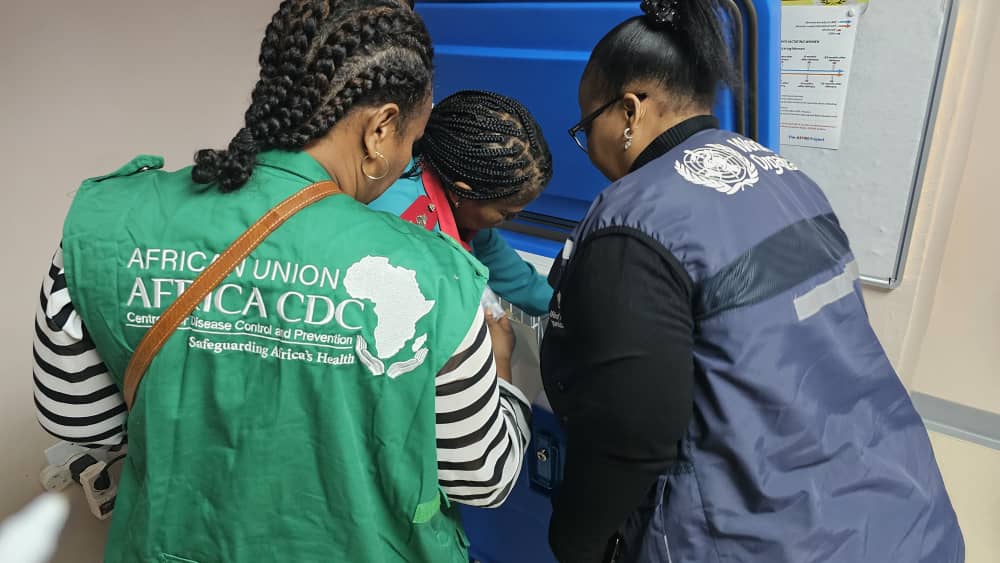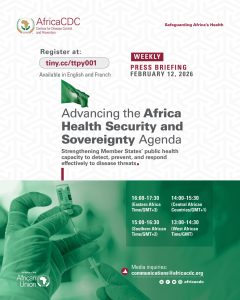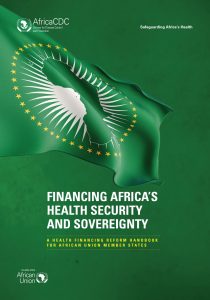Four years after Eswatini adopted five-dose Measles-Rubella vaccine vials for routine immunisation, Africa CDC joined WHO-AFRO, Eswatini’s Ministry of Health, and UNICEF to assess this pivotal shift. The transition aimed to boost vaccine efficiency, reduce wastage, and expand access, particularly in remote areas facing logistical challenges. The assessment examined how these vials are integrated into routine practices and explored the challenges healthcare worker’s encounter.
Conducted from October 4–8, 2024, the assessment employed several approaches, including reviewing key documents from the Expanded Program on Immunisation (EPI) to understand vaccination protocols, engaging in discussions with immunisation stakeholders, and visiting 16 health facilities across four regions. During these visits, healthcare workers were interviewed, vaccination practices observed, and data from the Common Management Information System (CMIS) was analysed.
“The assessment concluded with several recommendations, including improving communication channels, providing structured training for healthcare workers, preventing stock-outs of vaccines and diluents, and enhancing supportive supervision. Strengthening the surveillance system for measles and rubella was also highlighted as a priority,’’ the report stated.
The findings revealed that the Eswatini government has maintained a consistent supply of vaccines, ensuring uninterrupted immunisation services. Healthcare workers efficiently utilised the five-dose vials, significantly reducing wastage, and immunisation coverage remained high across the country, demonstrating strong community trust.
The surveillance system for measles and rubella has been effective, bringing Eswatini closer to elimination status for both diseases. The country has achieved several years with zero confirmed cases, showcasing the programme’s success.
Despite these positive outcomes, the assessment also highlighted challenges. The transition to the new 5-dose vials lacked a clear communication strategy, leaving many healthcare workers without adequate guidance or training. This affected outreach vaccination efforts and limited access to immunisation in some areas. Additionally, vaccine stock-outs were reported in some health facilities, particularly shortages of diluents, which are crucial for administering the MR vaccine. A few facilities used incompatible diluents, potentially compromising vaccine effectiveness. Healthcare workers also faced difficulties in CMIS data analysis, limiting their ability to monitor immunisation performance.
The assessment further identified that supportive supervision visits, essential for staff training and effective data use, had been infrequent. Surveillance activities had also diminished, creating gaps in monitoring potential outbreaks and disease spread. These issues underscored the need for a structured approach to training, supervision, and communication to ensure the smooth integration of the new vials.
Africa CDC played a key role throughout the assessment, working closely with healthcare workers to gather feedback and provide valuable recommendations. Their involvement strengthened collaboration among stakeholders and helped identify operational challenges, ultimately shaping the final recommendations to improve the implementation of the 5-dose vials.
The assessment concluded with several recommendations, including improving communication channels, providing structured training, preventing stock-outs of vaccines and diluents, and enhancing supportive supervision. Strengthening the surveillance system for measles and rubella was also highlighted as a priority.
Africa CDC’s role in this effort underscores its commitment to strengthening public health systems across Africa. Through collaborative efforts, the organisation is helping Eswatini achieve its immunisation goals, particularly in the fight to eliminate measles and rubella. A study, on ‘Tracking Measles and Rubella Elimination Progress,’published in August 2024 notes that as of December 2023, at least 12 countries had utilized measles-containing vaccines packaged in 5-dose or lesser dose vials for routine vaccination service. These are Botswana, Cabo Verde, Comoros, DRC, Equatorial Guinea, Eritrea, Eswatini, Lesotho, Mauritius, Niger, Seychelles, and Zimbabwe.







